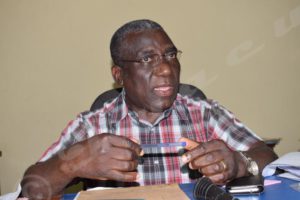The Governor of the Central Bank of Burundi announced on 24 January the repatriation of the foreign currencies resulting from the export of coffee, tea and mineral products. Exporters are concerned about the exchange rate from US$ to Burundi Francs given by the Central Bank.

Laurent Nkurikiye, chairman of COWASA, “we intend to meet the BRB authorities to discuss the exchange rate from US$ to Burundi Francs”
“Exporters will have to transfer their receipts to foreign currency accounts opened at the Central Bank of Burundi –BRB,” according to Jean Ciza, the Governor of BRB on 24 January. Ciza says that the measure is taken to reinforce control of foreign currency resulted from exported products. This measure will be implemented since 1 February 2017.
Before this decision was made, each exporter received the export license validated in the commercial bank.
Laurent Nkurikiye, chairman of COWASA, an association that gathers 68 companies exporting coffee, says that COWASA intends to meet the BRB authorities to discuss the exchange rate from US$ to Burundi Francs. On 27 January 2017, one US dollar traded at BIF 1678 at the BRB, while on the black market it traded at BIF 2700.
Nkurikiye says that the exchange rate from US $ to BIF will have an impact on prices. He asked the BRB to grant them a favorable exchange rate that would allow them to pay a good price to coffee growers and run their business well.
“To grind coffee, we import certain supplies. The BRB must therefore be able to make available foreign currency to coffee exporters who need them,” Nkurikiye says.
He says they are worried about the availability of export declaration and license that will be signed at BRB. ”We are concerned that the BRB could delay the delivery of our products, which would not be good for us,” says Nkurikiye.
Gabriel Rufyiri, chairman of a local anti-corruption NGO, OLUCOM, says that the BRB’s decision to repatriate exporters’ foreign currency presents a serious threat to the Burundian economy.
It will hamper the commercial banks from operating because they will no longer receive foreign currency, he says, while exporters will no longer trade freely as their money will be managed by the BRB.
“The BRB thinks it has found the way to earn foreign currency but this may push exporters to open foreign currency accounts in foreign banks to run their business freely, which will be a big loss for the country,” says Rufyiri.
In January 2016, the BRB ordered local NGOs benefiting from external aid to open foreign currency accounts in BRB.



















 IWACU Open Data
IWACU Open Data

